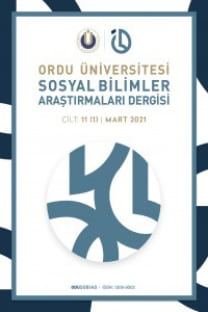1950 Kuşağı Kadın Öykücülerinden Nezihe Meriç ve Tezer Özlü’nün Öykülerinde Melankoli Üzerine Bir İnceleme
Türkiye’de 1950’li yıllar; siyasi, sosyal, kültürel açıdan değişim ve dönüşümlerin yoğun yaşandığı bir dönemdir. Varoluşçuluk akımının etkisi ile aşılmaya çalışılan varoluşsal bunalımlar, modernizmle daha da artan bireyselleşme ve kentleşmenin getirdiği problemler, ülkedeki siyasi çatışmalar; toplumu, sanatı, edebiyatı etkisi altına alarak melankoliyi dönemin genel bir söylem dili hâline getirmiş; Türk edebiyatı tarihine “1950 Kuşağı, Bunalım Edebiyatı” nitelemesiyle farklı bir sayfa açmıştır. Kuşaktaki her yazar dönemin şartlarından ve değişimlerinden farklı biçimlerde etkilenmiştir. 50 Kuşağı öykücülerinden Nezihe Meriç ve Tezer Özlü bu farklılığın iki ayrı sembolüdür. Nezihe Meriç, toplumsal meselelerden önemli ölçüde etkilenmiş bunları öykülerinde melankolik bir söylemle aktarmıştır. Bu durum, anlatının yapısını da şekillendirmiş; yazar, sosyal meseleleri olay örgüsü, diyalog gibi klasik anlatım teknikleri ile aktarmıştır. Tezer Özlü ise toplumsal melankoliyi ikinci plana almış, daha çok kendi beninde yaşadığı bunalımları eserine yansıtmıştır. Özlü bu atmosferi kurarken; olay örgüsünün olmadığı, zihinsel sayıklamaların ve içsel konuşmaların mevcut olduğu anlatım tekniklerini kullanmıştır. Çalışmada, aynı kuşağın farklı kutbunda yer alan iki kadın öykücünün, öykülerindeki melankolik dil, söyleyiş ve tutum incelenmiştir. Amaç; edebiyat tarihinde yeni, değişen ve birçok noktada ortak söylem dili vücuda getiren dönemin, Modern Türk öyküsünde nasıl karşılık bulduğunu ve bu karşılığın iki kadın öykücünün öykülerinde ne şekillerde tezahür ettiğini incelemektir.
Anahtar Kelimeler:
melankoli, 50 Kuşağı, öykü, varoluşçuluk, yabancılaşma, melankoli, 50 Kuşağı, öykü, varoluşçuluk, yabancılaşma
A Study on Melancholy in the Stories of Women Storytellers of the 1950 Generation, Nezihe Meriç and Tezer Özlü
In Turkey 50’s are era that concentratedly experienced alteration and transformation in terms of political, social and cultural. Close relations with West have called forth to movement like modernism and existentialism. These have given acceleration to effort of rationalization and Westernization. Existentialist depressions that tried to overcome under the influence of effect of existentialism movement, individualization which increase further with modernization, politic clashes in the country have came upon the society, art, literature and resolved the melancholy to language of discourse of era. And it has turned a new page for Turkish Literarture with characterising “1950 generation, literature of depression”. While some authors from 50 generation reflected social issues, changes and depressions in their works with a melancholic language, some writers stayed away from social and political issues and reflected their own existence and alienation as a crisis in their works. Nezihe Meriç and Tezer Özlü, 50 generation storytellers, are two different symbols of this difference. Nezihe Meriç has considerable extent effected from social problems and has transferred these to the her stories with melancholically discourse. This situation has developed construction of narrative; author has transferred the social problems with classic articulacy techniques like story arc and dialogue. The negativities experienced by women who were excluded and oppressed in society, the political conflicts of the period and social tensions form the background of the melancholic atmosphere in Meriç's stories. Tezer Özlü also has put the social melancholy in the second place and reflected the depressions she experienced in her own self to her work. In these stories main is melancholy of individual who got lonely and became estranged. While creating this atmosphere Özlü, has used techniques without story arc and included delirias and inner dialogues. In the study, the "melancholic" language, utterance and attitude in the stories of two female storytellers from two different poles of the same generation were examined. The aim is to examine how the period in the history of literature, which is new, changing and has a common discourse language at many points, finds its response in the Modern Turkish story and how this response is manifested in the stories of two female storytellers.
Keywords:
melancholy, generation of 50, story, existentialism, estrangement, melancholy, generation of 50, story, existentialism, estrangement,
___
- Alver, K. (2005). Toplumsal Değişme ve Öykü. Hece Öykü, (12), 59–67.
- Atiker, E.(1998). Modernizm ve Kitle Toplumu. Ankara: Vadi Yayınları.
- Gıddens, A.(2010). Modernliğin sonuçları,(Çev. Ersin Kuşdil). İstanbul: Ayrıntı Yayınları.
- Burton, R. (2016).Melankolinin Anatomisi, (Çev. Merve Tokmakçıoğlu), İstanbul: Aylak Adam Yayınları
- Cevizci, A. (2018). Felsefe Tarihi. İstanbul: Say Yayınları.
- Cevizci, A. (2017). Felsefe Sözlüğü. İstanbul: Say Yayınları.
- Demirer, T. ve Özbudun, S.( 1990). Yabancılaşma. Ankara: Öteki Yayınevi.
- Jean-Paul, S. (2018). Varoluşçuluk, (Çev. Asım Bezirci), İstanbul: Say Yayınları.
- Julia, K. (2009). Kara Güneş, (Çev. Nesrin Demiryontan), İstanbul: Bağlam Yayıncılık.
- Karen, H. (1994). Nevrozlar ve İnsan Gelişimi, (Çev. Selçuk Budak), İstanbul: Öteki Yayınevi.
- Meriç, N. (2017). Toplu Öyküleri I, İstanbul: Yapı Kredi Yayınları.
- Meriç, N. (2015). Toplu Öyküleri II, İstanbul: Yapı Kredi Yayınları.
- Meriç, N. (2005). Yandırma, İstanbul: Yapı Kredi Yayınları.
- Rene G. (2018). Modern Dünyanın Bunalımı, (Çev. Mahmut Kanık), İstanbul: İnsan Yayınları.
- Sigmund, F. (2014). Yas ve Melankoli, (Çev. Aslı Emirsoy), İstanbul: Telos Yayınevi.
- Tezer, Ö. (2017). Eski Bahçe-Eski Sevgi, İstanbul: Yapı Kredi Yayınları.
- Teber, S. (2013). Melankoli ‘Normal Bir Anomali’, İstanbul: Say Yayınları.
- Topçu, N. (2017). Varoluş Felsefesi Hareket Felsefesi, İstanbul: Dergâh Yayınları.
- ISSN: 1309-9302
- Yayın Aralığı: Yılda 3 Sayı
- Başlangıç: 2010
- Yayıncı: -
Sayıdaki Diğer Makaleler
Hüseyin Rahmi Gürpınar’ın Muhabbet Tılsımı Romanında Batılı İfade Eden Söz Varlığı
Türkçe Öğretmeni Adaylarının Anahtar Yetkinlikler Algısı
Tahacan KARAHÜSEYİN, Hasan Hüseyin MUTLU
Bill Evans Doğaçlamalarında Armonik Yapı (“All The Things You Are” Örneği)
Halime Özlem ÇABUK, Sevinç EREN
Boşanma Nedenleri ve Boşanma Sonrası Psikososyal Uyum: Trabzon İli Örneği
Mikrotonal Gitarda Makamsal Müziğin Çokseslendirilmesine İlişkin Yaklaşımlar (“Allı Turnam” Örneği)
Video Platformlarında Strateji Oluşturma Modeli Önerisi: YouTube Blogu Tematik İçerik Analizi
Türkiye Üzerinde Yoksullaştıran Büyüme Hipotezinin Analizi: 1970-2020
Duygu ÇELİK, Atilla AYDIN, Burçin ÇAKIR GÜNDOĞDU, Selim AYKAÇ
